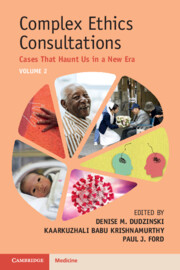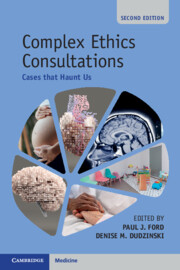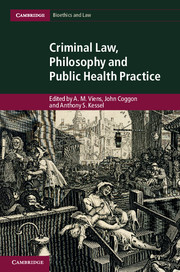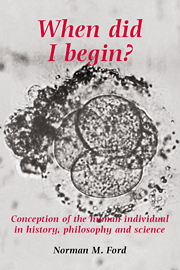Complex Ethics Consultations, Cases That Haunt Us in a New Era, Volume 2
Clinical ethics consultants navigate some of the most challenging cases in patient care, public health, and healthcare policy. The second volume richly details haunting cases pertaining to perinatal, paediatric, and end-of life issues; neurodiversity; disability; and employment of high-tech devices. Authors explain distinctive features of consultations in rural and pandemic contexts and complicated transitions into and out of inpatient care. Cases are grouped together by theme and organized uniformly. Each chapter includes a case presentation, the authors' professional reflections, description of haunting aspects, case outcome, and questions for discussion. Organizational ethics factors into many of the cases. The authors honestly describe the affective aspects of their work, including lingering regrets, doubts, and moral distress. They pay special attention to justice, equity and inclusivity. It is a fascinating and important read for clinicians and bioethicists engaged in clinical ethics consultations as well as ethics committee members and students.
- Featuring a standardized case format in each chapter, conducive to teaching in clinical and classroom settings (coursebook), and with a narrative and reflective structure supporting the resilience of clinicians in an era where burnout and moral distress are commo
- The array of case studies and the examination of professional practice assists readers in preparation for the Healthcare Ethics Consultation certification examination
- Offering rich cases studies conducive to growing concerns about pandemic response, justice and equity in healthcare ethics consultation help prepare consultants for the evolving practice of healthcare ethics consultation, including organizational ethics
Product details
December 2025Paperback
9781009400909
259 pages
234 × 156 mm
Not yet published - available from December 2025
Table of Contents
- Introduction
- Part I. Perinatal Dilemmas:
- 1. God's telling me I can't trust you Kathy Johnson Neely
- 2. High stakes, time pressure, and inadequate information: balancing risks in labor and delivery Annette Mendola
- 3. Balancing autonomy and interdependence: ethical considerations in shared decision making and reproductive rights Jennifer M. Wimbley and Teresa Ellis
- 4. Dying Together: a pandemic story Eli Weber
- Part II. From Childhood to Adulthood:
- 5. Reasoning from faith or fact Elizabeth Lanphier and Joseph Fanning
- 6. Overriding parental authority for a dying adolescent Ann Kessler and Olubukunola M. Dwyerage
- 7. Can medicine fix a broken story? When a broken body is only part of the tragedy Joel Wu, Justin Penny and Jaime Konerman-Sease
- 8. When we commit harm by omission: failing our most vulnerable Jessie Roske and Peter Bauck
- Part III. Neurodiversity, Disability, and Respect:
- 9. The noble intent of clinicians and the limitations of substituted judgment in deciding for others Liz Blackler
- 10. Silenced Bridget Carney
- 11. It could have been me Emma J. Kagel
- 12. Excluded from society: whose job is it to care (if not mine)? Elizabeth Sivertsen
- Part IV. End of Life (EOL) Decision-Making: Variations on a Theme:
- 13. No communication, no collaboration, no trust Patricia A. Mayer
- 14. Keep on keeping on? Erin Paquette, Joel Frader and Angira Patel
- 15. Locked in Marion Danis
- 16. The legacy of social determinants in a question of non-beneficial interventions Kristin Furfari
- Part V. Hi-Tech Devices and Techniques: Challenging Paradigms:
- 17. Is she being doubly victimized? Vulnerabilities in LVAD eligibility Laura Guidry-Grimes and Evan DeRenzo
- 18. Really, most sincerely dead? The challenge of declaring circulatory death on VA ECMO M. Jeanne Wirpsa
- 19. Who controls the medical technology placed in our bodies? Maggi A. Budd and Rod Dismukes
- 20. Who says it is a bridge to nowhere? Louis Voigt and Amy E. Scharf
- 21. I will just go home and die Paul Ford
- Part VI. Pandemic and Rural Context:
- 22. ECMO in the Covid-19 pandemic: weighing conflicting duties in the face of scarcity and vulnerability Kelly Turner, Jordan Potter and Jason Lesandrini
- 23. Well beyond rural: Alaska, Alaskan culture, and medicine Mark F. Carr
- 24. Cultural differences, misalignment, and moral distress Don C. Postema and Marlane J. Brown
- 25. When a fight for life initiates a search for trust Laura B. Webster
- Part VII. Complex Admissions, Stays, and Discharges:
- 26. Doing it to themselves: can repeated foreign body ingestion provide us ethical considerations for repeated self harm? Sara Kolmes, Kayla Tabari House and L. McLean House II
- 27. Withholding food to save a life: safe medical care or human rights violation? Can it be both? Heidi Funke and Bryan Gish
- 28. Relentless debridement: responding to moral distress provoked by non-beneficial surgical intervention Lauren Sankaray and Georgina Morley
- 29. What's in a name? Kaarkuzhali Babu Krishnamurthy
- Part VIII. Organizational Ethics Issues:
- 30. Disability, dignity, and risk of death: who decides? Lori Eckel and Celeste Weber
- 31. Balancing facts and feelings: when patient rights and employee safety collide Katie DiDomenico, Lyla Correoso-Thomas and Yelena Zatulovsky
- 32. Off the hook? TA-NRP and the pressures of organ procurement Denise Dudzinski and James N. Kirkpatrick
- 33. When institutional and personal conscience collide: navigating trauma exposure and dual roles as an ethics consultant Andrea Frolic
- Concluding Remarks
- Index.







